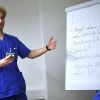Top quality across the board
Bill S. Hansson, Vice President of the Max Planck Society, on excellence and internationalisation.

Professor Hansson, why did you decide to pursue a research career in Germany nine years ago?
The offer to carry out research as Director of a Max Planck Institute is an internationally unique opportunity. You are granted security for your entire research career and no longer need to submit new applications every two or three years. If you successfully pass through the very demanding selection process, you enter a research environment in which all areas are shaped by outstanding researchers – that’s wonderful!
How does German higher education benefit from this level of excellence?
The Max Planck Society relies on networking – and we encounter great interest in cooperation on the part of universities. International Max Planck Research Schools (IMPRS) are a very important instrument of cooperation, and there are now 60 of these centres located all over Germany. Max Planck Institutes work with universities to train outstanding junior researchers – roughly half of whom come from Germany and half from abroad – and offer them excellent conditions for doctoral research. There are often as many as 100 applicants for a single place at an IMPRS. These research schools enable universities that have perhaps not yet developed a strong international presence to enhance their profile. The Friedrich Schiller University in Jena, where I work as an honorary professor, is involved in three IMPRSs.
Max Planck Institutes cooperate with universities all over Germany, often far away from internationally known cities. Do you consider this kind of diversity an advantage?
Germany upholds the principle that everyone should be able to receive a good research training anywhere in the country. But that is also the reason why Germany does not have any super-universities like Harvard or Yale. If the Max Planck Society were able to include its top institutes in the Shanghai Ranking, it would reach roughly fifth place. We contribute to the strengthening of research profiles in specific locations – for example, demographic research in Rostock and mathematics in Bonn. Cooperation works very well – also as a result of partnerships with university professors who maintain ties with us as Max Planck Fellows or as External Scientific Members of Max Planck Institutes.
If you look beyond the Max Planck Society, where do you see examples of the German research landscape strengthening its profile?
Germany has a highly differentiated research system in which non-university research institutes play a very special role by concentrating on their respective core competencies – from basic research to applied research. The Federal Government’s Excellence Initiative has increased the profile of Germany’s outstanding universities within the higher education landscape. And I think it is very good that Germany supports achievement and excellence. Talent, expertise and hard work are acknowledged and fostered in a targeted way. That should not be taken for granted, as a look at Scandinavia shows. There funds are distributed very, very equally, much to the detriment of cutting-edge research.
What further improvements can German research institutes introduce to make it easier for international researchers to work in Germany?
The question of how to encourage more international researchers to move to Germany is one of our primary concerns. Against this background, we are working to increase the number of “dual career” offers so that researcher couples can both work at institutions in Germany. Here, too, we are cooperating very well with universities, but there is still a lot to be done. The German language is also an obstacle for many. However, since I moved to Jena in 2006 I have experienced a change in German society. In recent years the country has become far more international and English is now also more widely spoken.
You speak very good German. How did you settle in here in Germany?
Very well. My wife joined me here in Jena with our two children as early as 2007. But we found the language a challenge. When I moved to Jena, I didn’t speak a word of German. The Max Planck Society and the Max Planck Institute for Chemical Ecology did everything they could to make us feel welcome.
Roughly one third of Max Planck Directors are not German citizens. When it comes to postdoctoral researchers, the proportion of foreigners is even higher at 86%. Nevertheless, when you were elected Vice President of the Max Planck Society in June 2014, you said further internationalisation would be one of your main tasks. Which priorities would you like to set here?
We maintain a global presence with our Max Planck Institutes and Max Planck Centres as well as a number of partner institutes abroad. Especially in Europe, however, we can still considerably increase our visibility. We would therefore like to cooperate more closely in future with other leading European research institutions – from the University of Oxford and ETH Zürich to the Karolinska Institutet in Sweden. At the same time, we attach great importance to the common European Research Area. There, however, research potential in Eastern Europe must be able to develop. This is where we wish to provide developmental support and promote our model, one which places special emphasis on excellence and clear quality criteria.
When you look into the future, which fields of research do you believe will be of central importance in coming years?
Questions of sustainable energy use and climate change will certainly continue to increase in importance. In my own research field, biology, I see a trend away from the dominance of molecular biology and towards a more extensive view of the organism as a whole. The great challenge in almost all research fields, however, is big data. We must find ways of producing relevant information from enormous volumes of data. ▪
Interview: Johannes Göbel

